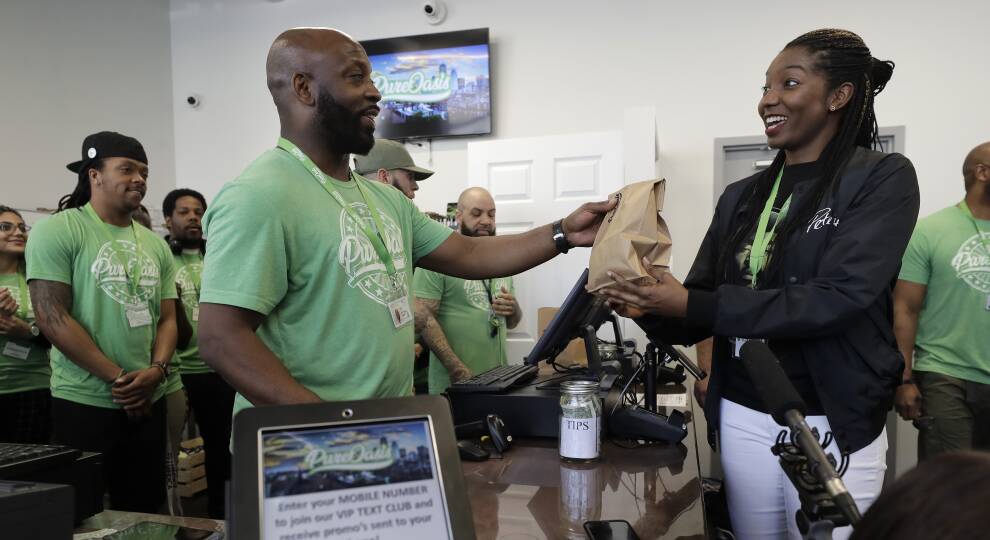FILE — Kevin Hart, front left, co-owner of Pure Oasis recreational marijuana shop, completes a sale of cannabis products moments after the store opened March 9, 2020, in Boston. Pure Oasis is Boston’s first recreational marijuana shop, and the state’s first black-owned one. Shannon O’Brien, the new chair of the Cannabis Control Commission, wants to prioritize social equity and removing burdensome regulation for marijuana entrepreneurs.
When Massachusetts residents voted to legalize recreational marijuana in 2016, communities braced for what new cannabis stores would mean for their neighborhoods.
“It was like an opium den is coming to the neighborhood,” Shannon O’Brien, the chair of the Cannabis Control Commission, saidon Boston Public Radio on Wednesday.
O’Brien said commissioners at the time tended to overregulate the new cannabis business landscape, knowing they could pull back regulations later on. Now, cannabis use and dispensaries are more normalized. She said it’s time to reevaluate some of the most restrictive regulations that “may or may not protect health and safety.”
For example, all marijuana businesses in Massachusetts are required to have on-site video surveillance and store the footage for 90 days so that it’s accessible for law enforcement and regulators.
“Maybe we only keep it for 60 days, so maybe you could save $3,000 a month in your cloud storage fees,” said O’Brien. “So that’s what I’m trying to do, is make sure that those businesses can thrive and profit, even though the price of cannabis has gone down by half.”
The commission is also focused on promoting active involvement and benefits for people who’ve been disproportionately harmed by the war on drugs. The reality of getting those people involved is another story.
O’Brien said close to a thousand people have gone through the Cannabis Control Commission’s social equity or economic empowerment programs. Certain application fees get waived, they are put at the front of the line, and they have access to training. The disconnect between this preparation stage and licensing their business is money, said O’Brien, which is particularly difficult during the startup phase.
Even if a cannabis entrepreneur has demonstrated they have a revenue stream, most banks will not work with them because marijuana is illegal at the federal level. To close this gap, the Social Equity Fund was established in 2022, which is supposed to set aside 15% of cannabis fees and taxes in fund for those entrepreneurs from communities disproportionately harmed by marijuana prohibition and enforcement. This could be some $15 million to $20 million per year, said O’Brien.
“But the problem is that’s assessed at the end of the year,” she said. “It’s a timing issue.”
O’Brien said she’s been working with Keisha Brice, the chair of the Cannabis Social Equity Advisory Board, which administers the fund, to work on how funding could be more continuous and accessible year-round for social equity candidates.
While the infrastructure for the fund is worked out, O’Brien said she’s looking for ways to collaborate with outside groups to support entrepreneurs of color. Four hundred “social equity” entrepreneurs have been provisionally licensed, O’Brien said.
“I think we should be focusing on those 400 applicants, that have demonstrated the ability, and then figure out how we get them over the line to get them to commence operations,” she said.
Another plan currently on hold is establishing social consumption sites for cannabis. The Cannabis Control Commission wrote a pilot program for these sites in 2019. When asked how long until the public can expect to see these sites in their communities, O’Brien said, “I can’t answer that question.”
“You should bring commissioners Camargo and Stebbins to come in and talk about it,” she said. Those commissioners are in the process of hearing from stakeholders about the potential impact of these consumption sites. O’Brien said she has requested a Nov. 9 deadline to determine next steps.
H/T: www.wgbh.org



